Against a dying Russia
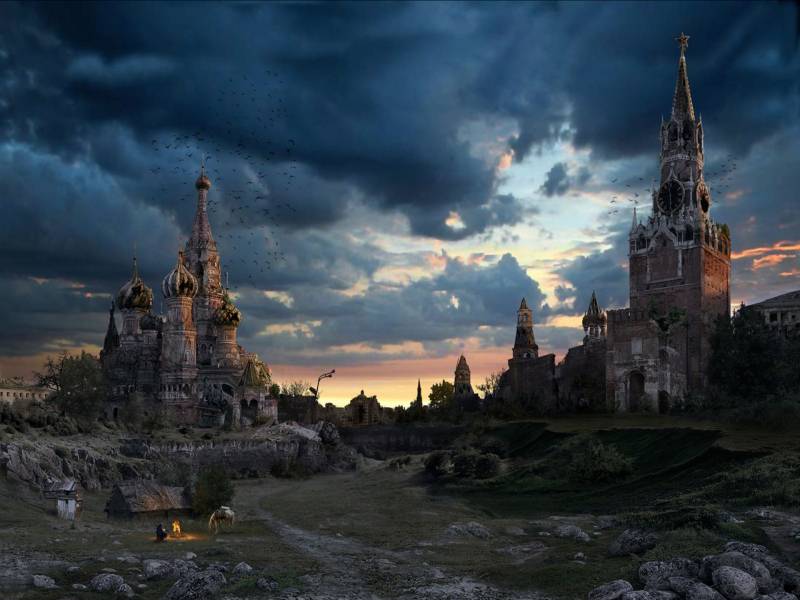
Necessary preface. This topic has already been raised on our pages more than once, but this time, as it seems to us, we got a small series of articles on one topic. Theme "tomorrow" for Russia.
It seems to us that this time, with the appearance of a projectile (it’s definitely not a cartridge) in the main clip of a projectile from Tomsk Andrey Grezin, it turned out not only to give a new impetus, but to reach a new level of dialogue. The statistics offered by Andrey, it does not just throw out a bunch of numbers, it gives an understanding of the problem we have run into. And what is the way out of the situation in which Russia found itself - this is a separate topic for conversation.
So please be patient and read on.
We complain here that it somehow happened that some generations that weren’t like that grew up. Instead of Marinka, they were ready to storm Upper Lars and stay with him forever. Not respecting either the country or the state. We criticize and condemn, but in fact, we are already dealing with the finished result. And why this happens, many, if they ask a question, do not really want to know the answer to it for many reasons, many of which lie in us.
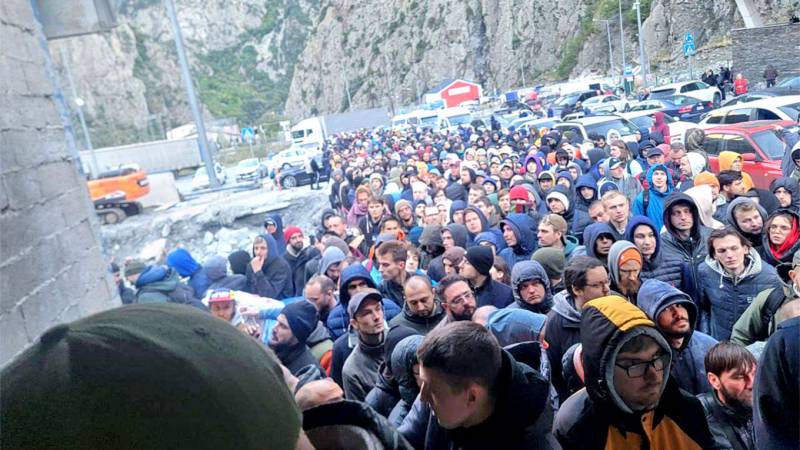
Meanwhile, the point is not in insufficient state funding of patriotic projects, but in the absence of a state ideology and the liquidation of a class of teachers whose purpose was not educational, but educational activities.
The disorganization of the processes of raising children in Russia is the true reason for the degradation of the strong-willed, moral and ethical qualities of the youth of Russia and the growing protest movement among the youth. They are waging war against Russia not only in the "hot phase", but also in the field of educating future generations (children). And Russia is losing this battle, and not just losing it, this battle is already very close to its end. That is, to the complete defeat of Russia.
The state simply will not have at the disposal of citizens who are ready to fight for it. Here it is worth recalling the decline and fall of the Roman Empire and drawing analogies. Very similar in some places.
There will be no country without citizens. Without children there will be no citizens. Everything seems to be simple, right? But in the 32 years after the collapse of the USSR, almost 16 people died "in excess of the norm" in Russia. “Above the norm” it is not the elderly who die, but people of able-bodied age who do not “fit into the economy”, young people from drug addiction, alcoholism and moral decay. And the wars are here.
For 32 years after the collapse of the USSR, 26 children were not born in Russia. In total, in 000 years Russia has lost 000 people.
And this is not counting the children that these “unborn” 26 million citizens were supposed to give birth to. And in 32 years, this is about another 10-12 million people.
The countdown goes not from 1991, but from 1988, because in 1986 the systemic dismantling of the USSR began with a decrease in living standards. In 1986, as part of the economic reform, it was liquidated, including the middle management of retail trade - thus the reformers decided that they would launch free trade in the USSR.
Who will be very interested in the question in detail, it is recommended to familiarize yourself with the scientific work of E.V. Shabashova (candidate historical Sci., Associate Professor of the Department of General Humanitarian Disciplines of the Russian Academy) “Deformation of the Soviet Management System during the “Perestroika” Period on the Example of State Retail Trade”. The work perfectly illustrates the understanding of the processes that took place precisely in the 80s of the last century.
In short:
- a violation of the management system was organized;
- the information storage system is completely destroyed. In the system of state trade, these were the Departments of Trade, which had comprehensive information about the situation, for example, in trade facilities.
- Destroyed for the sake of the emerging market, the management system of trade and departmental trade, which led to a critical situation with the supply of workers in industrial enterprises and organizations.
- in the central government bodies of the USSR and the republics in various departments, 593 thousand employees were reduced, only in Moscow - 81 thousand. The number of structural divisions of the central administration was reduced by 40%. Thus, coordination and the vertical of control were destroyed.
- the lack of a vertical of control quickly led to the disruption of interdepartmental relations, exacerbated the shortage of goods.
- a rapid decline in production began, which covered almost all sectors of the national economy. This led to a crisis in the consumer market, the situation with food supply was especially difficult, and the living conditions of the population worsened.
As a result, the lack of a regulatory framework and clear control by the state provoked a shortage of goods and social tension in society.
To reduce social tension, for the fourth time in the period of Soviet history, a distribution system was introduced to provide the population with necessary goods using coupons.
A sharp rise in prices, the disappearance of goods from the retail network, the introduction of rationing for basic products, the emergence of "uncertainty about the future" naturally turned into a decrease in the birth rate and an increase in mortality.
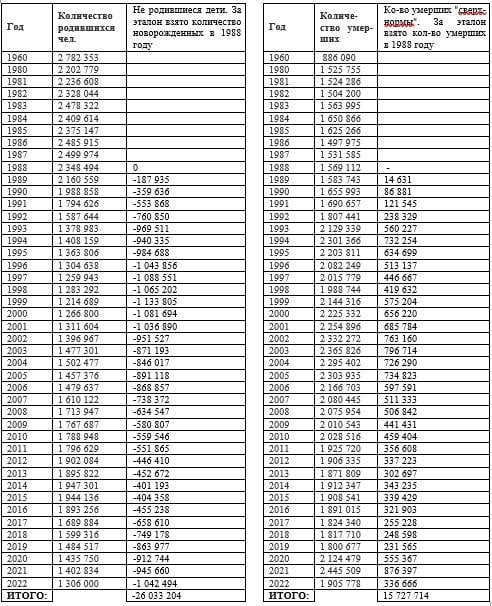
Today, these terrible losses are not yet felt - the country has a working population from 1960 to 2005 (about 80 million people). But another 25 years will pass and there will be no more citizens born in the USSR among the able-bodied population, even taking into account the pension reform. By 2050, without any war, the population of Russia will be reduced from 146 million to 110 million people, and the working-age population will be reduced from 82 million to 50 million. This table shows the calculation data of various organizations and specialists.
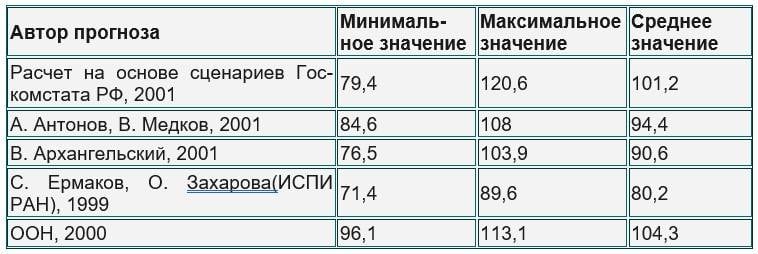
The death of Russian citizens of working age was confirmed by Rosstat data published in March 2023. In accordance with these data, as of January 1, 2023, the number of pensioners in the Russian Federation amounted to 41,78 million people.
Let's look at the statistics for the period 1986 - 2022

Let's compare the demographic composition of the population of the Russian Federation in 1986 and 2022:

From the above data it can be seen that while maintaining approximately the same number of the entire population of the country (due to migration inflow), there is a decrease in the number of children and citizens of working age. And this is without taking into account the national and personnel composition of migrants.
It would be more correct to take into account the demographic decline without taking into account migrants - after all, migrants, for the most part, are carriers of a different national code, often of other nationalities and, mainly, representatives of working professions. And emigrants from Russia are just educated specialists with a national code. Therefore, it is a mistake to replace the mechanical replacement of 1000 programmers who emigrated from Russia with 1000 citizens of the Republic of Kyrgyzstan of working specialties who decided to take a second citizenship in the Russian Federation.
Reference. In total, in 1989-1999, according to the Ministry of Internal Affairs of the Russian Federation, 1 people left Russia for a permanent place of residence.
According to the experts of the portal "Such things", from 2000 to 2020, up to 5 million citizens of the Russian Federation left Russia. Portrait of emigrants from Russia for the period from 2000 to 2021: 55% aged 30-40, 12% under 30; 92% of them have higher education, 14% have an academic degree. 45% had a specialist or bachelor's degree, 36% had a master's or PhD degree.
Reference. According to the Federal Migration Service of the Russian Federation, about six million Russians can have second citizenship, while 30% of Russians with dual citizenship are citizens of the CIS countries (who came to work).
If we take into account all these data, then the number of citizens of the Russian Federation in working age should be reduced by another 6 million people, and then the picture will become even more sad.
THE MOST IMPORTANT
To serve the territory of any country, there must be a minimum allowable number of people (as in an apartment - the larger the house, the more time and effort is needed to clean it, keep it clean and tidy). It's the same with the country. The area of Russia is 1/6 of the land. It is unacceptable to reduce the number of border troops below the minimum. It is clear that for security reasons. The same applies to the army.
It is unacceptable to reduce below the minimum the number of specialists who maintain railways and roads, power plants, nuclear power plants, power lines and much more.
Russia has the most difficult living conditions of all countries on the planet. To maintain life, we need a huge amount of thermal energy (for heating houses, factories, plants, etc.). For this reason, the cost of any product (in terms of energy costs for production) will always be higher than in other countries. Due to the length of routes, we have higher costs for the delivery of raw materials and finished products. To ensure communications between Moscow and the Far East, aviation, airports, maintenance personnel. Since 1/3 of the country is tundra and taiga, Russia needs small aircraft, a developed fleet of helicopters, a repair base, service personnel, etc. And it's all people, people, people.
The upcoming struggle for the Arctic requires the creation of new, Arctic, border troops, the Arctic fleet, and an additional staff of response troops. And it's people again.
Again, the political situation in the world requires keeping nuclear deterrents in full combat readiness and promptly updating the fleet of missiles and warheads. Given the development of hypersonic weapons and unmanned aircraft, new developments and the creation of the latest deterrence forces are needed. We need a strong scientific base. And smart citizens. Smart citizens in particular. Before our eyes is the example of China, where the citizens are definitely not stupid, but as they are - a country-copywriter in terms of military equipment.
And here is the most important question: without which there will be no nuclear shield, no science, no Russia?
Without future citizens of Russia, without our children. After all, we are talking about the survival of Russia, the preservation of statehood, the further development of the country and the state.
We need many children and we expect a lot from our children. We need honest, purposeful, educated, wise, hardworking, responsible, courageous, fair, optimistic and humane, true patriots who love their Motherland. Those who can protect the country, provide us with a decent old age, and the further development of Russia.
After all, selfish, insecure, stupid, uneducated, lazy, irresponsible, lethargic, weak, cowardly, depressed and hating their homeland will not be able to defend themselves, or us, or Russia.
How to make sure that children grow up with the necessary qualities, with strong characters, educated and smart? On whom or what does the child acquire the necessary skills, the formation of the necessary character traits, ethical standards, worldview and the right ideals? Let's try to figure it out.
How does a person become a person?
At one time in Britain, research was carried out on the phenomenon of Mowgli children. In India (at that time a direct colony of Britain) there were many children who, having lost their way, were taken into a flock and raised by animals. And studies have shown that if a child has lived with animals (wolves, foxes, dogs, etc.) until the age of five, he will never evolve into a person.
These children never start talking or reading. They are sometimes taught to wear clothes and eat from a plate, but at the first opportunity they run away to their tribe, and among people such people do not live long - they die for no apparent reason. Those. it turns out that you, dear reader, and I have become people only because you and I were brought up by people.
Unfortunately, this conclusion is also true in the following statement. How to raise a child - so he will become. There are no born fascists or born pacifists. These are all acquired qualities. If during the period of personality formation (from 1 to 18 years) a person is instilled with certain values, then the person will follow these values all his life.
In the Ottoman Empire from 1380 to 1826, the Janissaries were the basis of the infantry units. It was they who steadily and fanatically carried out the will of the Sultan to seize new and hold the conquered lands, and in peacetime they performed the functions of policemen, security guards, firefighters and even executioners.
Janissaries were created in the following way: children from 8 to 14, and according to some sources, up to 18 years old, captured, were given up for education in Turkish families of inner Anatolia. Most often these were the children of Christians. In the new family, they adopted the new religion of Islam and studied the Turkish language and traditions, which is why they were called “shifters” (in Turkish, the shifter is Janissaries).
This is how warriors were made from Christian children, who later slaughtered their fellow tribesmen. This is for you and me, ordinary citizens, all this is a wonder, and professional psychologists have long figured this out. Here is what Professor Eric H. Erickson, USA, writes about this (12th place among the most cited psychologists of the XNUMXth century):
That is, anyone can be raised from any child. You can grow a fascist, or you can grow a communist, you can grow a cannibal, or you can grow an intellectual, you can grow a crook or a bandit, or you can grow a law enforcement officer.
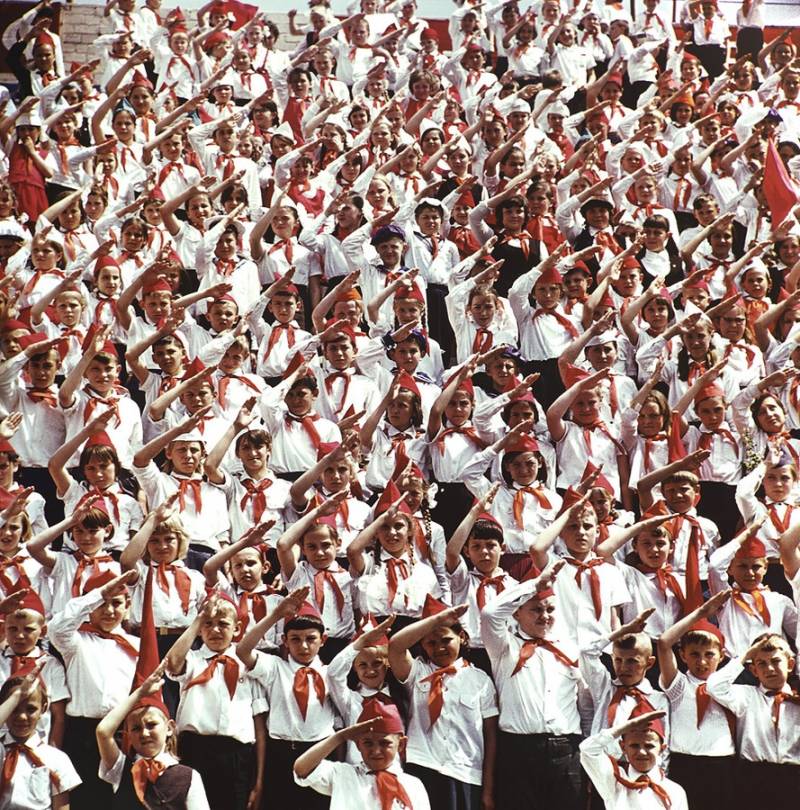
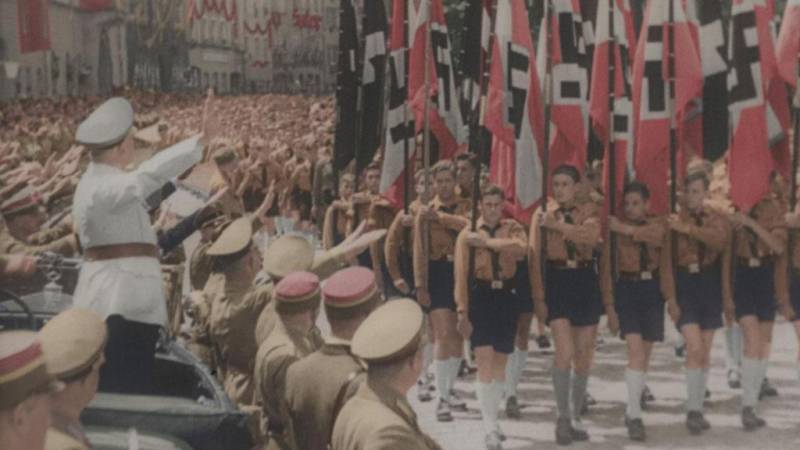
You just need to teach, directing the child in the right direction in the process of personality formation. But you can only do this once. There is only one attempt to form the personality of the child, his worldview, you can once instill moral norms and choose ideals.
Remarque. In psychology, there is the concept of "sensitive periods of development" - periods of greatest sensitivity to certain kinds of influences. So, for example, the sensitive period of speech development is from a year to 3 years, and if this stage is missed, it is almost impossible to compensate for losses in the future, as we saw with the example of Mowgli children.
The concept of "sensitive periods of a child's development" was introduced by an outstanding domestic psychologist, psycholinguist, defectologist, world-famous scientist L.S. Vygotsky (1896-1934).
L.S. Vygotsky came to the conclusion that a child's education should precede, run ahead of, pull up and lead development. This statement has become an axiom in child psychology and pedagogy.
The next important discovery of a brilliant scientist in child psychology was the age determination of periods in a child's life that are most favorable for the development of certain functions of an individual. This knowledge is necessary for teachers and parents in order not to miss the most favorable period for the child's education, so that those "developing kidneys", which are maturing processes in the "zone of proximal development", can fully develop and enrich the physical, intellectual, emotional , social and cultural opportunities in the future life of the child.
These are the periods:
1,5-3 years. The period of bright speech perception, vocabulary replenishment. At this age, the child is very receptive to learning foreign languages. It is also favorable for the development of motor skills, manipulations with objects, perception of order;
3-4 years. This period is most favorable for getting acquainted with the symbolic designation of numbers and letters, preparing for writing. Conscious speech and understanding of one's own thoughts are developing, there is an intensive development of the sense organs;
4-5 years. This period is marked by the development of interest in music and mathematics. The activity of the child in the perception of writing, color, shape, size of objects increases, intensive social development takes place;
5-6 years old. The most favorable period for the transition from writing to reading. This period is very important for instilling in the child social skills and ethical behavior;
7-12 years old. During this period, the child develops an understanding of the structure of human society. The categories of "good" are formed - that for which everyone loves and encourages, and the category of "evil" - that which is not accepted and punished for. During this period, the child develops an understanding of what needs to be learned in order to take a worthy place in the world of adults (I want to be an astronaut, a doctor, etc.).
13-18 years old. The period of the deepest crisis. During this period, the final formation of personality takes place. A holistic identity of the individual, understanding the structure of human society, knowledge of the place that a teenager can claim, self-confidence, competence allow a teenager to be confident in choosing a life path.
When it is not possible to realize oneself and one's place in human society, there is a diffuseness of identity. It is associated with an infantile desire not to enter adulthood for as long as possible, with a stable state of anxiety, a feeling of isolation and emptiness. Diffusion of identity can manifest itself in a hostile rejection of social roles that are desirable for the family and the immediate environment of a teenager (gender, national, professional, class, etc.), in contempt for everything domestic and overestimation of foreign things, in the desire to "become nothing" (if the only remaining way of self-assertion).
A. V. Petrovsky (Doctor of Psychology, Professor, Corresponding Member, Full Member and Vice-President of the USSR Academy of Pedagogical Sciences, President of the Russian Academy of Education 1991-1996, died in 2006) revealed from whom our children adopt moral norms, worldview , values and forms of behavior.
The formation of personality is determined by the characteristics of the child's relationship with members of the reference group. The reference group is the most significant for the child in comparison with the rest, he accepts precisely its values, moral norms and forms of behavior. At each age stage, he is included in a new social group, which becomes a reference for him. First it is a family, then a kindergarten group, a school class and informal teenage associations. Any such group is characterized by its own activity (or set of activities) and a special style of communication. It is precisely the "activity-mediated" relationship of the child with the group that influences the formation of his personality.
That is, it turns out that in order to raise a child with the necessary character traits, the necessary values, the necessary moral standards, the necessary worldview, it is necessary to place the child in a social group where all of the listed qualities are the norm and ideal, are welcomed and defended by all members of the group ( society).
A reference group is a group of people with a similar social status, income level, style and other characteristics with which a person compares himself.
In this case, it turns out that for the student his family cannot serve as a reference group. Indeed, in a family, a child has no one to compare himself with - in the family everyone is older than him, except for brothers and sisters (if any), and have a different social status and a different circle of interests. And if brothers or sisters are significantly older or younger than him (and for children “significantly older” is a difference in age of 2 years or more), then they also have a different range of interests and a different social status.
Therefore, the reference society for a student, of course, is his class (more precisely, classmates) or members of his sports team, peers at school on the stream and peers on the Internet.
The links in the reference group are so strong that friends sometimes carry out the ritual of "fraternization", thus carrying out a kind of rejection of their biological family.
Friendship is a personal stable relationship between people based on sympathy, respect, common interests, spiritual closeness, mutual affection and understanding. (Big psychological dictionary)
And the totality of values accepted in society, worldview, moral norms and forms of behavior - this, whatever one may say, is called Ideology.
Conclusion: in order to raise a child with the right traits of character, the right values, the right moral standards, the right worldview, it is necessary to place the child in a social group in a timely manner, where all of the listed qualities are the norm and ideal, are welcomed and upheld by all members of the group (society).
And you need to remember that there is only one attempt, limited in time, more precisely, by the age of the child.
On this we are forced to stop in our story, since this is the end of the introductory part and in the next one we will be able not only to ask topical questions, but also to give answers and recommendations to them.
Perhaps everything turns out to be rather cumbersome and verbose, however, the question raised on the topic is very voluminous.
Here we have determined what is needed for the education and preparation of a citizen of the future Russia. In the second part, we will explain why this cannot happen in the next ten years or more.
Information